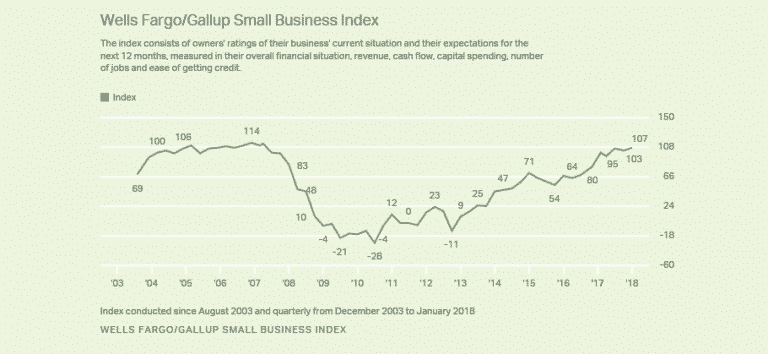People like Jeremy Grantham, Ray Dalio and Larry Fink are onto something when they talk about the stock market moving into overdrive because of economic growth. As we await the latest US GDP numbers tomorrow, all of the data are pointing up. And this portends well not just for tomorrow’s number but for Q1 2018 numbers as well. The Fed will react
Depending on the source, consensus estimates are for 2.9 to 3.0% annualized GDP growth in the quarter just ended in December. That follows two previous quarters of 3% growth. If one looks at year-on-year growth trends, given that annualized growth in Q4 of 2016 was only 2.1%, the Q4 numbers will put US trend growth closer to 3% than 2% for the first time in 3 years.

Source: St. Louis Fed
Moreover, right now the New York Fed Staff Nowcast has Q1 2018 at 3.1%. As with the Q4 reading, the Q1 2018 number will replace a weak number — 1.2% annualized growth in Q1 2017, likely bringing trend growth all the way back to 3%.
I believe this Q1 nowcast is promising, if a bit early. All signs are that US businesses are moving into high gear. In particular, the new order numbers in the latest ISM Manufacturing Index support the view that businesses are ramping up production so much that we will be able to maintain 3% growth. Moreover, Gallup released its Small Business Index today. And the numbers were at a decade-high.

Source: Gallup
My view:
The economy is solid, which is bullish for shares. There is little indication that any material economic weakness is on the immediate horizon in the US. The jobless claims numbers released today are in that same vein — rock solid, suggesting a tightening labor market. Given the baseline growth, corporate tax cuts will only add to the bottom line at US companies. And this is supportive of Dalio, Fink and Grantham’s view that markets will move higher from here.
But the Fed will be forced to act. Dalio acknowledges that the Fed will be forced to tighten policy gven where things are headed. That’s something Dalio considers bond bearish, because he believes they will need to be more aggressive than they have signalled to date. But if you play this scenario out to its logical conclusion, however, this is only bearish for the short term or if inflation returns and the Fed continues to raise rates without triggering a recession.
Inflation is the key. If inflation remains in check, long-dated US government bond yields will plummet. We should consider the very real possibility that the Fed is in error in fighting consumer price inflation because of its reliance on a flawed Phillips Curve model view. That would mean raising rates pre-emptively will backfire and trigger recession, just as Dalio suggested in conversations with Bloomberg yesterday. However, if we do get the Dalio scenario of a Fed tapping the breaks hard enough for the economy to hurtle into its back — and inflation remains contained — Gary Shilling’s bond bullish view is the one to follow rather than Ray Dalio and Bill Gross’s call of a historic bond bear market.














Leave A Comment